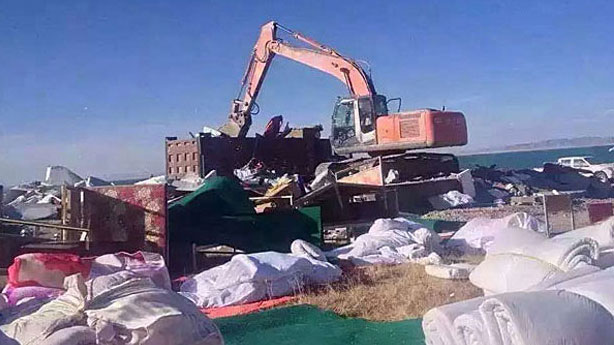Tibetan shops, hotels forced to close at scenic Qinghai Lake
| Publisher | Radio Free Asia |
| Publication Date | 17 October 2017 |
| Cite as | Radio Free Asia, Tibetan shops, hotels forced to close at scenic Qinghai Lake, 17 October 2017, available at: https://www.refworld.org/docid/5a9427b6a.html [accessed 3 June 2023] |
| Disclaimer | This is not a UNHCR publication. UNHCR is not responsible for, nor does it necessarily endorse, its content. Any views expressed are solely those of the author or publisher and do not necessarily reflect those of UNHCR, the United Nations or its Member States. |
2017-10-17
 Chinese work crews tear down Tibetan shops and homes at Qinghai Lake, June 2016. Photo sent by an RFA listener
Chinese work crews tear down Tibetan shops and homes at Qinghai Lake, June 2016. Photo sent by an RFA listener
Authorities in northwestern China's Qinghai province are forcing Tibetans living near scenic Qinghai Lake to close shops and guesthouses set up for visiting tourists, resulting in severe financial hardship for those affected by the order, a local source says.
The move follows similar campaigns undertaken in the Tsolho (in Chinese, Hainan) Tibetan Autonomous Prefecture over recent years in the name of protecting the environment around the lake, a resident of the area told RFA's Tibetan Service.
"Chinese officials say that the uncontrolled spread of unauthorized structures along the lake mars the landscape and causes pollution and environmental degradation," RFA's source said, speaking on condition of anonymity.
"In reality, it is the local Tibetans themselves who clean up any waste that has been dumped. The Chinese government hardly cares about it all," he said.
Two places on the road surrounding Qinghai Lake – Chema Labden and Chaling – have become especially popular with tourists who enjoy watching birds and riding four-wheeled motorbikes in the sand, the source said.
"Given this ideal opportunity for trade, Tibetans have set up tents and makeshift stalls to cater to the tourist trade, with some Tibetans wearing traditional dress to pose with tourists for photographs," he said.
"However, toward the end of August, Chinese officials came to the area and forced them to close everything down. And many Tibetans have now lost everything they had, since they took out loans to start their businesses and now have nothing with which to pay them back."
"They are very sad and upset at this loss of their right to make a living," he said.
Hundreds destroyed earlier
A June 2016 campaign to tear down unapproved structures along a scenic stretch of Qinghai Lake resulted in the destruction of over 600 shops, restaurants, and homes, with not only Tibetan but also Muslim and Han Chinese property owners affected, sources told RFA in earlier reports.
Chinese police later attacked a group of Tibetans protesting the destruction of their businesses and private dwellings.
The June 23 assault left at least eight seriously injured, sources said.
Tibetans living in China frequently complain of political, economic, and religious discrimination as well as human rights abuses, and sporadic demonstrations challenging rule by Beijing have continued in Tibetan-populated areas since widespread protests swept the region in 2008.
Reported by Kunsang Tenzin for RFA's Tibetan Service. Translated by Dorjee Damdul. Written in English by Richard Finney.
Link to original story on RFA website
